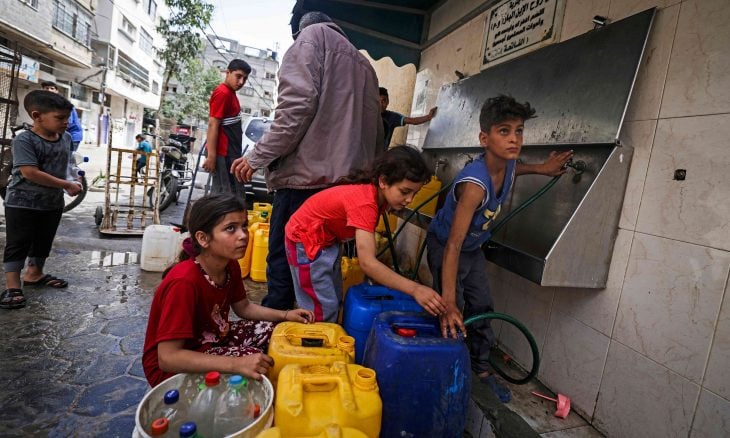Ramallah: SHAMS Center affirms that the Israeli occupation’s denial of water entry to the Gaza Strip and banning any water supplies, through the borders, are collective punishments. Cutting off water is a form of collective punishment and a violation of the International Humanitarian Law. In particular, cutting off water violates the Geneva Fourth Convention, which protects civilians in war and armed conflicts. Article 33 of the Convention states: “Individuals should not be collectively punished for the actions of others and prohibits acts of intimidation or terrorism against civilians”. Article 54 of the Optional Protocol annexed to the Geneva Convention (paragraph 1) states: “Starvation of civilians as a method of warfare is prohibited”. Paragraph 2 of the Convention states in the same regard: “It is prohibited to attack, destroy, remove, or render useless objects indispensable to the survival of the civilian population, such as foodstuffs, agricultural areas for the production of foodstuffs, crops, livestock, drinking water installations and supplies, and irrigation works, for the specific purpose of denying them for their sustenance value to the civilian population or to the adverse Party, whatever the motive, whether in order to starve out civilians, to cause them to move away, or for any other motive”. The Israeli policies violate Article 14 of the Second Optional Protocol annexed to the Geneva Convention related to protecting the victims of non-international military conflicts.
SHAMS Center affirms that the collective punishments are an interpretation of the statement given by the Israeli War (Defense) Minister, who declared that Gaza will be without (electricity, food, water, or fuel. He added that no life elements will be allowed in the Gaza Strip and that Israel is fighting human animals). Such a statement reflects the level of criminality and inhuman behavior of the Israeli occupation where the civilians in the Gaza Strip are deprived of their basic life needs. The Gaza Strip is the most dentist populated region in the world where there are 5500 persons per square kilometer. Additionally, the Gaza Strip faces the problem of scarcity of rain where the average annual rainfall is 327 millimeters. Such an average is considered low compared to the average in the other Palestinian governorates and consequently, people have to depend on the underground water to fulfill their needs for drinking, agriculture, and daily usage. The source of the underground water is the coastal water basin that stands below the entire Gaza Strip. However, the majority of the underground water is polluted as a result of being mixed with sewage water and sea salt water. For that, 97% of the underground water in the given basin does not accord with the standards of the World Health Organization. As a result of the pollution of the underground water and the scarcity of rainfall as well as the small number of available water desalination plants, the only source of water in the Gaza Strip is the Israeli Water Company- Mekorot. 20 million cupid meters of water are provided to the Gaza Strip annually. The daily average of water usage per capita in the Gaza Strip should be 82.7 liters, according to the reports of specialized organizations in this field. However, Palestinians in the Gaza Strip do not enjoy this amount of water as a result of the shortage of water supplies by the Israeli company. The average water supply assigned to the Israelis per capita is three doubles the amount assigned to the Palestinians. The amount assigned for the Israelis is 300 liters per capita and the amount doubles 7 times (compared to Palestinian capita) when it comes to the Israeli settlers in the West Bank. The average consumption of Palestinians of water is less than the average identified by the World Health Organization (100 liters per day). The reason for such a situation is that the Israeli authorities control 85% of the water resources available in the West Bank (according to the reports of the Palestinian Water Authority).
SHAMS Center condemns stealing Palestinians’ underground water in the Gaza Strip by the Israeli government, by digging wells to pull out the underground water, on the eastern borders of the Gaza Strip. Additionally, the Israeli forces shelled and demolished the Water Desalination Plants in the Gaza Strip (Al-Qarara and Northern Plant, Deir Al-Balah Plant, and the Southern Plant). Additionally, within its aggression against the Gaza Strip, the Israeli forces demolished the underground water wells used for drinking, leading to thirsting and torturing people, mainly women, and children. Additionally, the Israeli government is depriving the hospitals of the sweet water needed for the patients and treatment process, especially surgeries.
SHAMS Center stresses that the use of prohibited weapons by the Israeli forces in the Gaza Strip (Phosphorus, stun grenades, and thermobaric bombs) has long-term impacts on the environment and will need years to overcome the impacts, especially on soil. Additionally, it will contribute to the spread of pandemics alongside pollution of the underground and seawater.
SHAMS Center calls on the United Nations, international environmental organizations, the World Health Organization, and international human rights organizations to fulfill their humanitarian duties, intervene urgently, and exert pressure on the Israeli occupation government to restore the water supply to the Gaza Strip. They also demand an immediate cessation of hostile actions targeting civilian infrastructure, especially water tanks, artesian wells, and water desalination plants in the Gaza Strip

